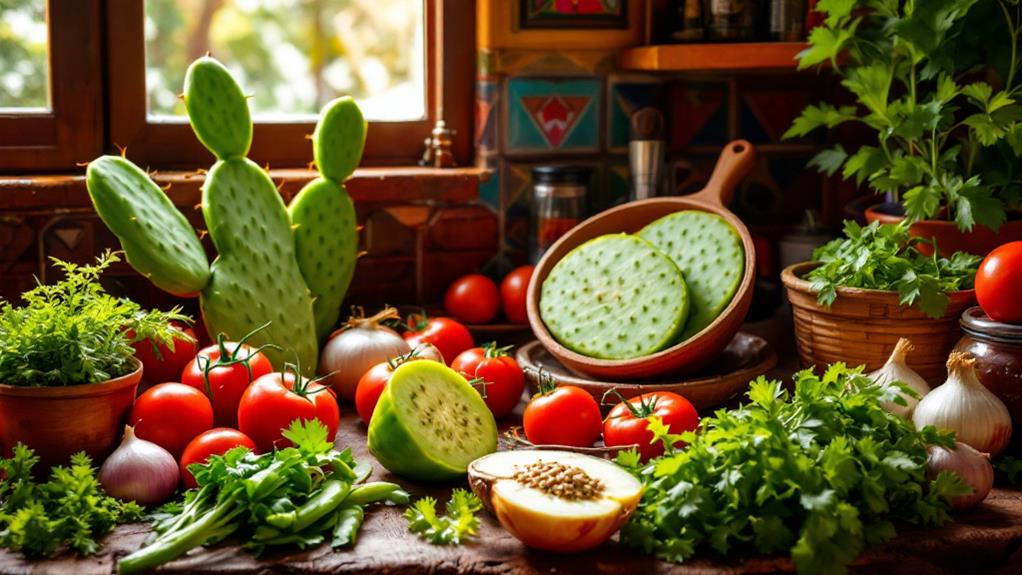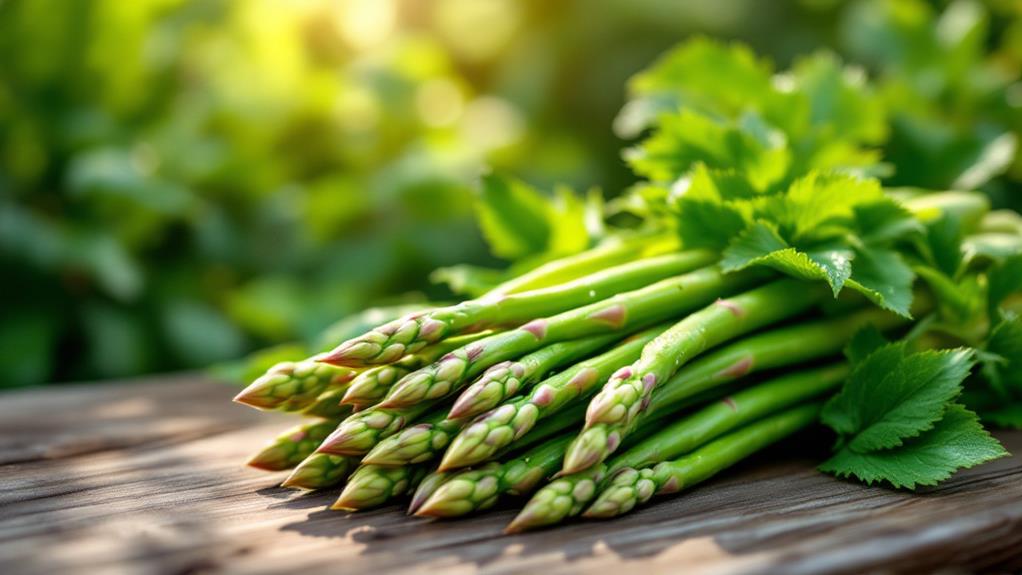A Complete Guide to the Types and Benefits of Jackfruit
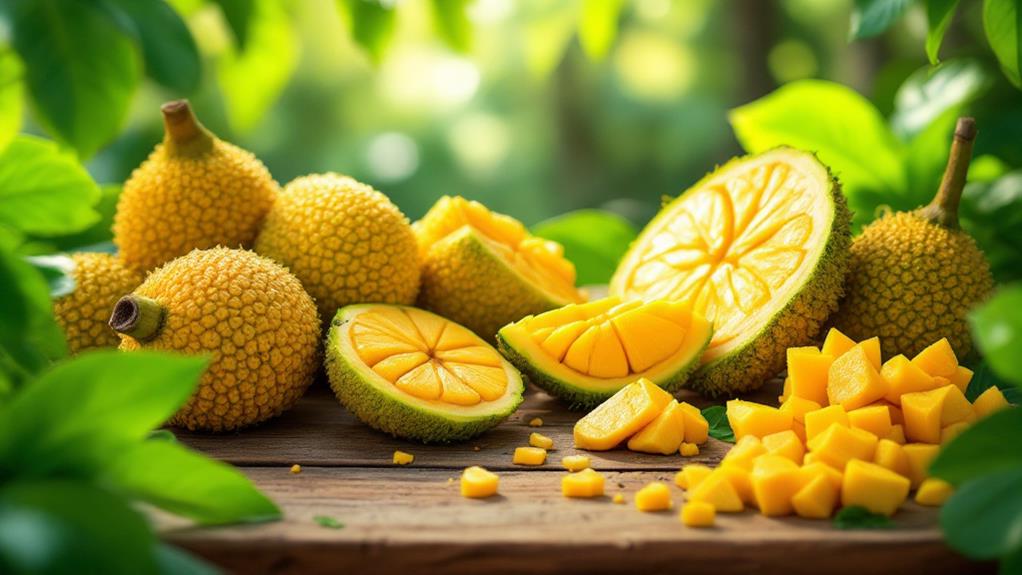
Uncover the wonders of jackfruit, the versatile tree-borne giant. With its sweet, fruity taste, ripe jackfruit is perfect for desserts, while its unripe, neutral form shines in savory dishes. You'll get a fiber-rich, nutrient-packed delight with high vitamins C, B6, and potassium, great for digestion and heart health. Investigate firm varieties like Cochin and aromatic soft ones like Black Gold. However, be cautious if you have allergies or kidney issues. Master preparation using gloves and oil to manage sticky sap, and learn the best storage methods. For a delightful culinary experience and sustainable choice, there's much more to reveal.
Understanding Jackfruit
In the tapestry of tropical fruits, jackfruit stands out not only for its sheer size but also for its versatility and nutritional benefits. As the largest tree-borne fruit, jackfruit, or Artocarpus heterophyllus, can weigh up to 120 lbs. It's not just its size that's impressive; its nutritional profile is packed with health benefits. Regardless of whether you choose ripe or unripe jackfruit, you've got a versatile ingredient that can improve your meals.
Ripe jackfruit's large, bright yellow pods offer a sweet flavor, blending hints of pineapple, banana, and mango. This makes it perfect for desserts. In contrast, unripe jackfruit has a neutral taste, making it ideal for savory dishes, especially in plant-based diets. Its high fiber content helps with digestion, while vitamins and minerals like vitamin C, B6, and potassium support general health.
Varieties of Jackfruit
Exploring the diverse varieties of jackfruit reveals a rich tapestry of flavors and textures. In terms of jackfruit, you'll find two main types: firm varieties and soft varieties. Firm varieties like Cochin, Dang Rasimi, and Honey Gold offer a crunchier texture. Cochin is particularly small, often under 5 pounds, making it a convenient option for those who prefer manageable sizes. Dang Rasimi is appreciated for its mild sweetness, offering a delightful flavor without overpowering your taste buds. Honey Gold stands out with its rich sweetness, a popular choice for those who want a burst of flavor.
On the softer side, you've got varieties like Black Gold and Cheena, which are cherished for their sweet aroma and easy extraction. Black Gold, with its softer consistency, makes enjoying jackfruit a fragrant experience. Cheena, known for its beautiful scent and flavor, is perfect for those who appreciate a sweeter taste without much effort. The Golden Nugget variety is notable for its excellent flavor, often sought after for both fresh consumption and culinary uses. Regardless of whether you're cooking or enjoying it fresh, these varieties of jackfruit offer something special for every palate.
Nutritional Breakdown
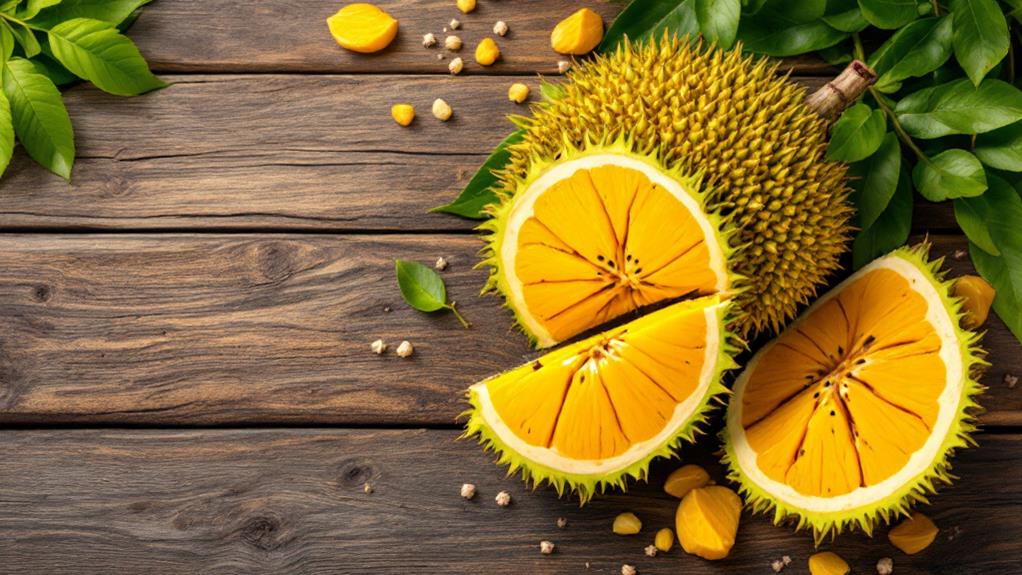
After appreciating the distinct types of jackfruit, it's important to understand its nutritional value. A single cup of raw jackfruit packs approximately 157 calories, making it a moderate energy source. You'll get about 2.8 grams of protein and 38.3 grams of carbohydrates, which are fundamental macronutrients for your diet. Despite its carbohydrate content, jackfruit has a low glycemic index, making it a smart choice for managing blood sugar levels.
Jackfruit is rich in important vitamins and minerals. You'll benefit from about 23 milligrams of vitamin C per cup, which supports your immune function. Furthermore, the 739 milligrams of potassium aid in regulating blood pressure, contributing to general cardiovascular health. The dietary fiber content, around 2.5 grams per cup, plays a significant role in digestive health, helping you meet the recommended daily intake of 21-38 grams for adults.
Don't overlook jackfruit seeds, which add extra protein and nutrients to your meals. While jackfruit may not be the highest source of protein, its combination of vitamins, minerals, and fiber provides different health benefits, making it a valuable enhancement to a balanced diet.
Health Advantages
Many health advantages come with incorporating jackfruit into your diet. Initially, jackfruit is a good source of vitamin C, offering 23mg per cup, which supports your immune system and helps reduce inflammation. This vitamin is essential for maintaining a robust immune response and potentially improving skin health. The antioxidants in jackfruit also play an important role by lowering oxidative stress, which can reduce the risk of chronic diseases like heart disease and cancer.
Furthermore, jackfruit is rich in fiber, with 2.5g per cup, which promotes digestive health. This fiber content helps regulate bowel movements, preventing constipation and fostering a healthier gut. The fiber also aids in Weight Loss by making you feel fuller for longer, reducing the likelihood of unnecessary snacking.
Additionally, jackfruit helps manage blood pressure thanks to its potassium content, which is 739mg per cup. This mineral can help control high blood pressure and decrease the risk of heart disease. Here's a summary of its Significant Health Benefits:
- Immune Support & Skin Health: High in vitamin C, aids in reducing inflammation.
- Digestive Health & Weight Management: Rich in fiber, helps with satiety.
- Heart Health: Potassium helps regulate blood pressure.
Potential Side Effects
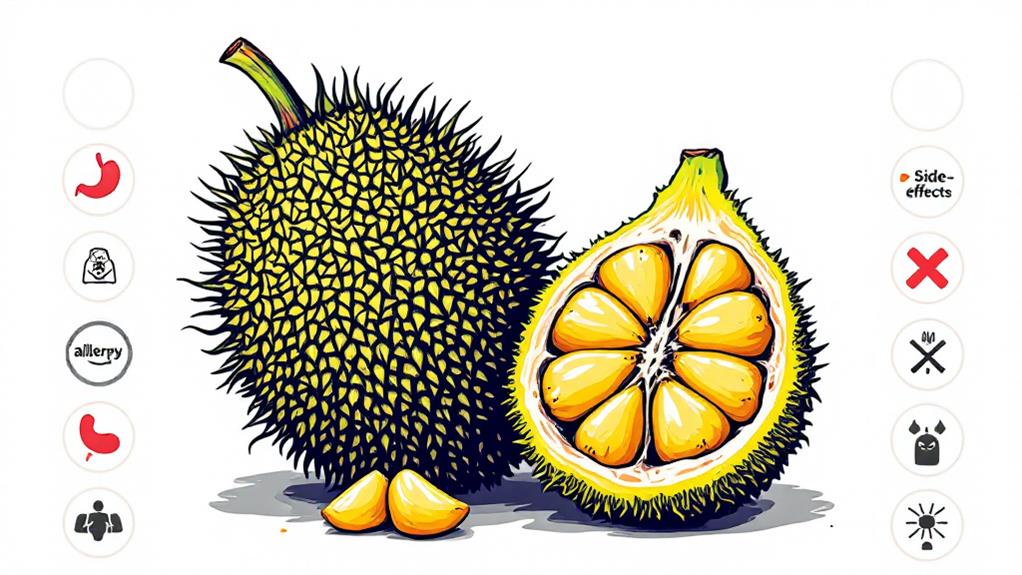
While jackfruit offers numerous health benefits, it's vital to be aware of its potential side effects. Jackfruit may cause allergic reactions, especially if you have latex or birch pollen allergies. These reactions can manifest as hives, swelling, or even difficulty breathing. If you're prone to these allergies, exercise caution before trying jackfruit. Furthermore, if you have kidney disease, be mindful of the high potassium content in jackfruit, as it can lead to hyperkalemia—an excess of potassium in the blood—if consumed in large quantities.
Overconsumption of jackfruit is another concern, as it may lead to gastrointestinal issues. The fruit's high fiber and sugar content can cause stomach aches or diarrhea, especially if you're not used to consuming a lot of fiber. In addition, jackfruit seeds should not be eaten raw because they contain a chemical that interferes with digestion. Always cook the seeds to avoid adverse effects.
Before incorporating jackfruit into your diet, consult a healthcare professional, particularly if you're concerned about food allergies or underlying health conditions. This step is vital to guarantee that you can enjoy jackfruit without compromising your health.
Culinary Applications
Jackfruit often shines in a variety of culinary applications due to its adaptable flavor and texture. Regardless of your investigation into its use as a meat substitute or tapping into its sweet potential, jackfruit caters to diverse cooking preferences. With its neutral flavor, young jackfruit becomes a favorite in savory dishes, effortlessly taking on the spices and sauces it's cooked with. Here are three ways to improve your culinary experience with jackfruit:
- Savory Dishes: Use young or canned jackfruit in curries, tacos, or as a BBQ pulled "pork" alternative. Its fibrous texture mimics shredded meat, making it a perfect supplement to plant-based meals.
- Sweet Treats: Ripe jackfruit's sweet, chewy flesh can transform desserts, smoothies, and fruit salads, offering a tropical twist with hints of banana, pineapple, and mango.
- Global Cuisine: Investigate jackfruit's versatility across cultures by trying recipes like Filipino halo-halo, Indian Kathal ki sabji, or Indonesian ginataang langka.
Canned or pre-shredded jackfruit simplifies preparation, fitting easily into any meal plan and accommodating dietary needs. Regardless of being a seasoned chef or a curious home cook, jackfruit invites you to experiment and enjoy its unique qualities.
Preparation Techniques
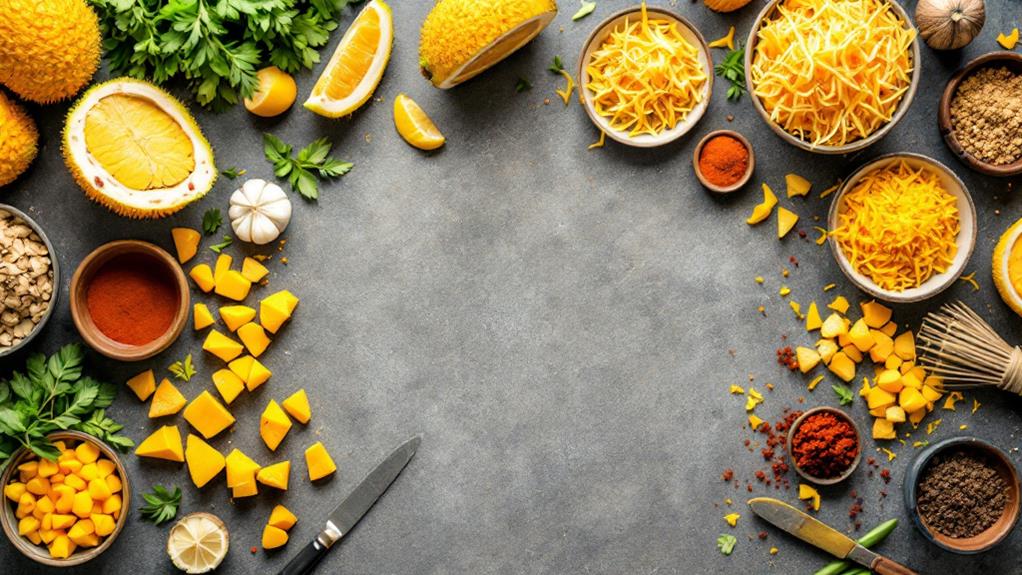
Before diving into the delightful culinary possibilities of jackfruit, mastering its preparation is fundamental. Begin by donning gloves and oiling your knife; this prevents the sticky sap from adhering to your hands and tools. To cut jackfruit, slice it into 2-inch rounds, then halve these rounds to remove the core and access the edible pods. Carefully pull out the fleshy pods by hand, ensuring you discard any white fibrous parts, as they're not edible.
Once you've extracted the pods, the seeds come next. Split the pods lengthwise to reveal the seeds, which should be cooked before consuming. Cooking seeds is important as it eliminates digestion-inhibiting chemicals, making them safe to eat.
Both ripe and unripe jackfruit offer unique culinary applications, and proper preparation techniques are significant to enhancing the texture and flavor in dishes. Ripe jackfruit is sweet and perfect for desserts, while unripe jackfruit, often compared to meat in texture, is excellent for savory dishes. With these preparation techniques mastered, you'll reveal the full potential of jackfruit, transforming it into a delicious component of your culinary repertoire.
Storage Tips
When it comes to storing jackfruit, knowing the right techniques can make all the difference in maintaining its flavor and texture. Regardless of whether you've got ripe jackfruit or young jackfruit, proper storage is vital. Here are some storage tips to help you:
- Refrigeration for Ripe Jackfruit: Store ripe jackfruit in the refrigerator to extend its freshness. Wrap it in plastic or place it in airtight containers. This method will keep it fresh for up to 7 days.
- Freezing for Longevity: If you want to preserve jackfruit for a longer period, freeze jackfruit. This way, you can maintain its quality for several months. Just make sure to cut it into pieces before freezing for easier use later on.
- Choosing Canned Jackfruit: When selecting canned jackfruit, pay attention to labels. For savory dishes, choose "young" jackfruit or those packed in brine. For desserts, go for ripe jackfruit packed in syrup.
Always handle fresh jackfruit carefully. Use gloves and oil your knife to deal with the sticky sap, which can be tricky to remove. Let the jackfruit ripen on the counter until it becomes fragrant and slightly soft before refrigerating.
Sustainability Impact
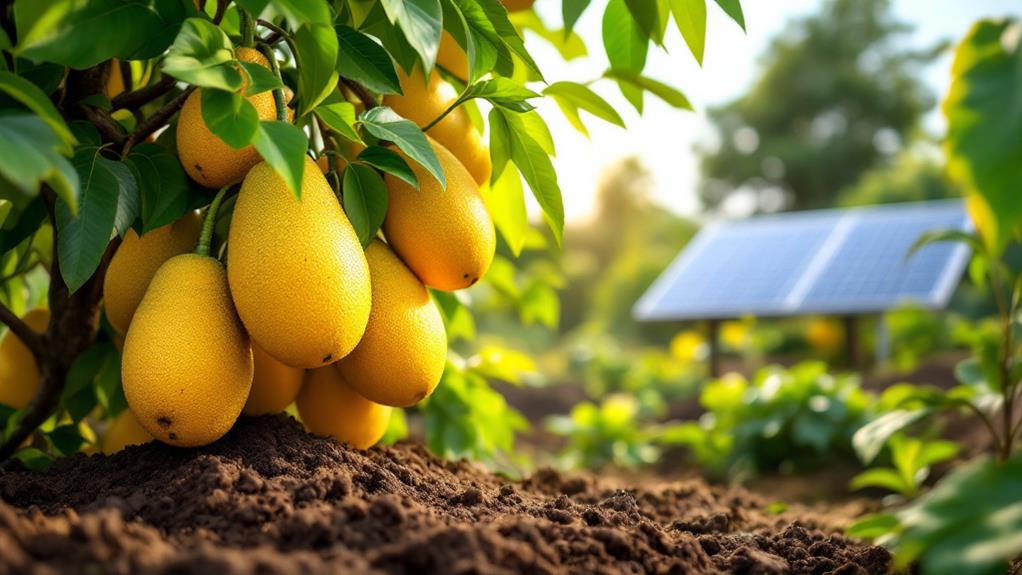
Exploring the sustainability impact of jackfruit reveals several compelling benefits for both the environment and communities. As a drought-resistant crop, jackfruit is an excellent choice for farmers in sub-tropical climates, reducing the need for water-intensive farming. This makes it a sustainable crop that supports water conservation efforts. You'll find that jackfruit trees are incredibly productive, yielding between 100 to 200 fruits annually. This high yield makes them an efficient food source, offering substantial nutritional benefits to communities with minimal resources.
Moreover, jackfruit cultivation improves biodiversity by providing habitats and food for wildlife, thereby promoting ecosystem health. When you incorporate jackfruit into your diet as a substitute for meat, you're actively reducing your carbon footprint. Plant-based foods like jackfruit generally require fewer resources and emit fewer greenhouse gases than animal farming, making them a more sustainable dietary choice.
Furthermore, sustainable farming practices associated with jackfruit promote soil health and reduce reliance on chemical fertilizers. This not only benefits the environment but also contributes to long-term agricultural sustainability. By choosing jackfruit, you're supporting a crop that positively impacts both the ecosystem and the communities relying on it.

